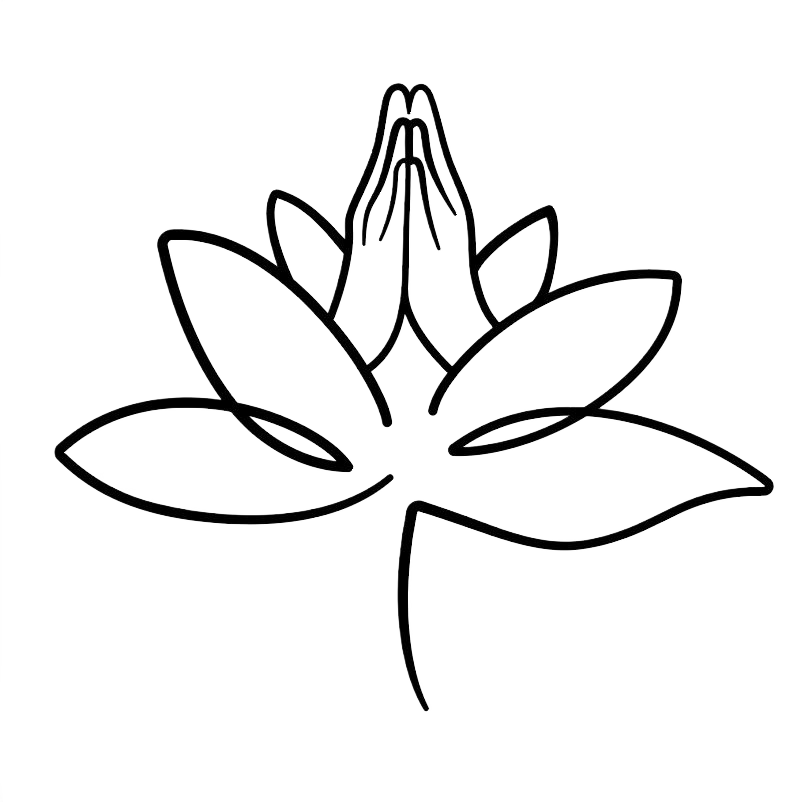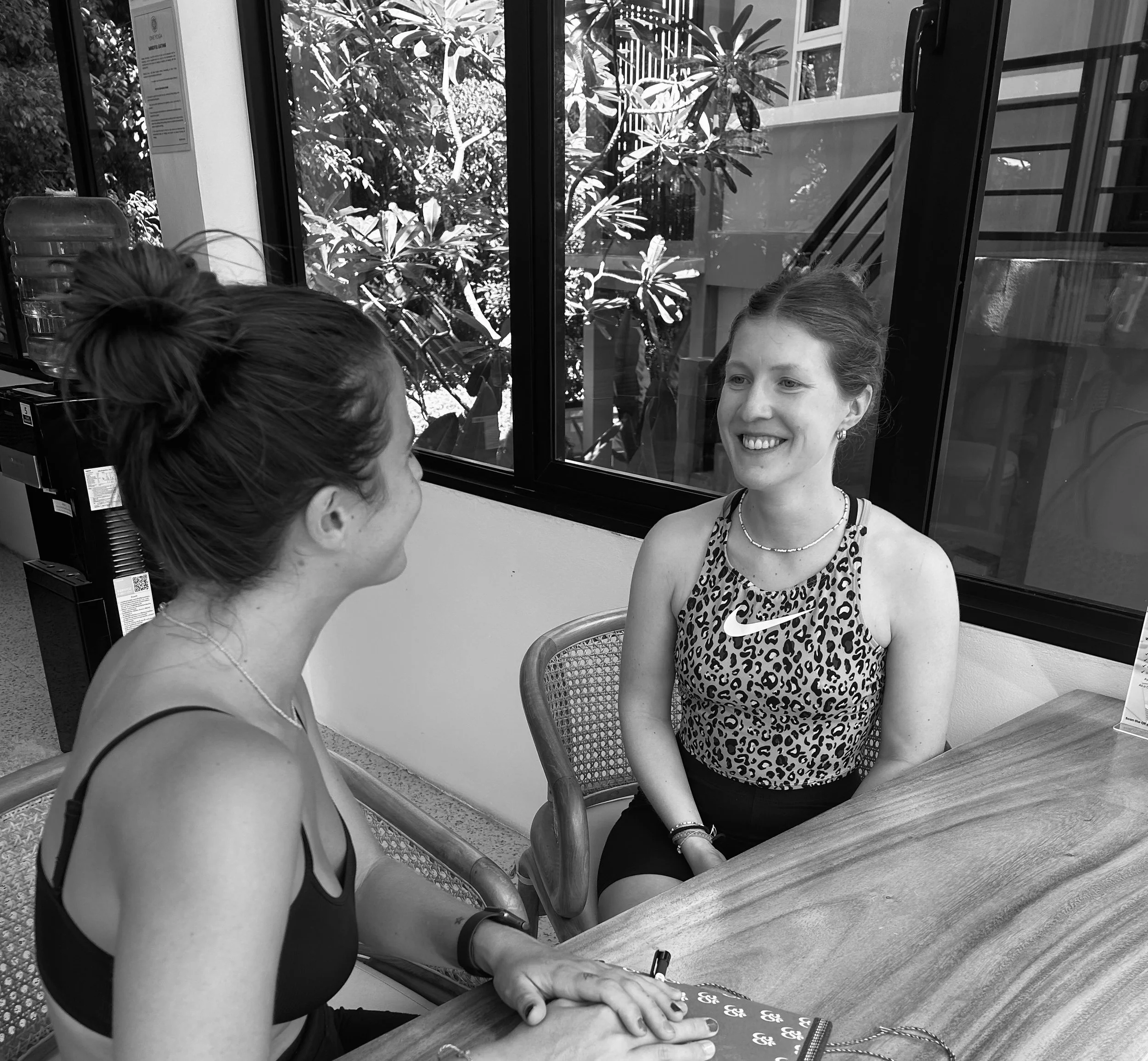Meeting Yourself Through Meditation: A Conversation with Sophia
Charlotte interviewing Sophia on the right
Today, I want to talk about meditation — something familiar to everyone, yet not fully understood.
Meditation is one of the pillars of yoga. The sage Patanjali explains in his philosophy that there are eight pillars leading toward the path of awakening. He describes them in his texts, the Yoga Sutras.
Among these, Dhyāna, or absolute meditation, is the seventh pillar. Through meditation, the yogi seeks to free themselves from both external and internal noise. Dhyāna is the liberation from the ego. Few yogis reach this state, but in our Western world, the benefits of meditation are well recognized. We practice it to calm the mind, find peace, and face our thoughts without distraction.
Personally, I meditate to calm my constant stream of thoughts. I often compare my busy mind to a popcorn machine — I experience a kind of mental hyperactivity, and meditation helps to quiet that. But that’s not all: when I meditate, I have an appointment with myself, without expectations. I reconnect with my essence, returning to that deep identity of “I am.”
My encounter with Sophia
To explore whether meditation is accessible to everyone, I meet Sophia, 28 years old, in Koh Phangan, where she’s attending a retreat. We sit down to talk about her experience.
C: Sophia, could you introduce yourself a bit so readers get to know you?
S: Mhmm… I’d say I’m an open-minded person. In daily life, I’m disciplined, and I love having routines. People describe me as reliable and funny.
At this point, we share a laugh, because indeed, in just a short time, I can sense her playful side.
Her relationship to yoga and meditation
C: Do you practice yoga regularly?
S: No.
C: And meditation?
S: Also no.
C: Would you like to bring these practices into your life?
S: Yes. About two years ago, I started meditating with an app, but without consistency. Now, my goal is to practice more often.
C: Why do you want to meditate?
S: It helps me become more aware. Here at the retreat, combining it with the asanas (yoga postures) allows me to access myself. The focus is really placed on this practice, which helps me concentrate on me. Integrating this practice into daily life is one of my goals.
C: So you’re looking to bring more awareness into your life?
S: Yes, especially in a life that’s often stressful, where there’s always something to do. I think it would help me calm down.
The origin of the need to meditate and its effects
C: Why did you first feel the need to meditate?
S: The first time I meditated, I was stressed. After my studies, I moved into a shared apartment in a new city, and I didn’t feel comfortable. I started a new job I didn’t like, and I felt sad and worried about my life choices. That’s when I tried meditation.
C: Did it help you?
S: Yes.
C: Did it help you accept your sadness and feel more at ease with your life?
S: I don’t remember exactly, but I know it helped me focus on something else, not just on what wasn’t going well.
C: Would you say meditation helps you become more aware of what you like and what you want to change?
S: Definitely. During practice, you become more self-aware. It allows you to identify emotions and accept them with objectivity.
C: So you’d say meditation helps you regulate your emotions?
S: Yes, absolutely.
C: Here in Thailand, far from your daily routine, how does meditation feel to you?
S: I have mixed feelings. I look forward to all the sessions, to being with myself and my thoughts. I try not to identify with everything that crosses my mind, but sometimes I wonder how long it’s going to last and wait for it to end. It’s an intense experience, sometimes difficult.
The relationship to modern distractions
C: Do you think today we’re too distracted — by screens, social media, the flood of information — and that more and more people are trying to reconnect with themselves through meditation?
S: Absolutely. I deleted all my social media because it’s too easy to get lost in it. Without those distractions, you’re much more present.
C: Do you have expectations in your practice? Have you ever felt frustration?
S: That’s a tough question. I’ve never really thought about it, but I think at the beginning, yes, I did. Thanks to my teacher, I’ve learned that whatever you experience in meditation is exactly what you’re meant to experience. You have to accept that in order to practice with awareness and kindness. And yes, sometimes I’ve been frustrated, especially with the discomfort: like sitting still when my foot falls asleep. At first, I struggled, but now I manage.
C: How do you handle it? Many people struggle with those physical sensations.
S: First, I focus on the part of my body that’s falling asleep. Then, I shift my attention to my breath. For me, it’s important to feel the discomfort, accept it, and then let it pass.
C: Would you recommend meditation? Why?
S: Yes! You access yourself, you become aware of your body, your mind. And you can simply be there, with yourself, without expectations.
C: What can we wish you for the future?
S: To keep practicing regularly, reminding myself it doesn’t have to be perfect.
We end this interview by wishing her continued appointments with herself, to experience that feeling of self and inner peace.
I love presenting meditation as a practice accessible to everyone. It takes discipline, whether guided or silent. But I also believe each person finds their own way to meditate, to reconnect with themselves, to elevate spiritually — whether through art, music, walking, or even sports — as long as it’s done with awareness and without particular expectations.
– namastecharly

